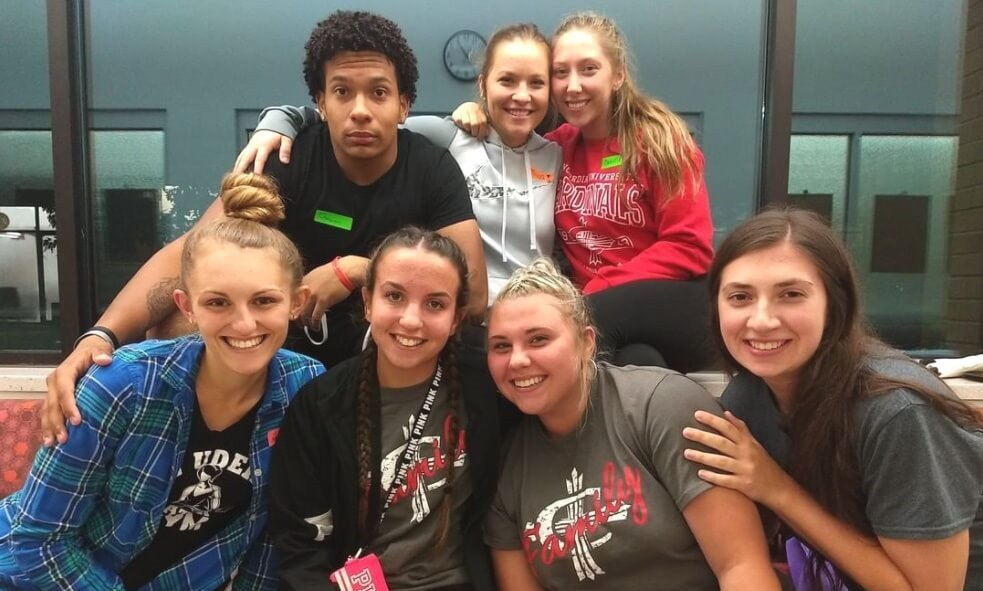 CUAA Social Work students (photo taken before COVID-19)
CUAA Social Work students (photo taken before COVID-19) Concordia University, Inc. is one of 28 organizations nationwide, and the only one in Michigan and Wisconsin, to be awarded a Health Resources & Services Administration (HRSA) grant to expand access to behavioral health services for families affected by opioids and other substance use disorders.
HRSA—the primary federal agency for improving access to health care services for people who are uninsured, isolated, or medically vulnerable—awarded nearly $12.5 million this year to the organizations. Concordia’s award totals $2.2 million over four years. Nearly $500,000 of it is designated for the 2020-21 academic year.
Led by Social Work faculty on both the Ann Arbor and Mequon campuses, Concordia will use the grant funding to educate and train professionals in Michigan and Wisconsin to treat individuals who suffer from opioid abuse or addiction, with a special focus on helping family units.

Michigan and Wisconsin’s opioid and substance use disorder statistics mirror the national picture, with opioid-related deaths having increased ten-fold in Michigan alone since 2010. The opioid crisis has been shown to have a direct impact on the delivery of human services. As an example, the American Academy of Pediatrics reported in 2017 that substance abuse accounted for 33 percent of the 6,380 cases in 2016 of out-of-home placement of children.
“We’re seeing the damaging effects of opioids and the devastating impact they’re having on family units,” says CUWAA Department of Social Work Chair Dr. Charnetta Gadling-Cole, who was the lead author on the grant proposal. “Social workers are in a prime position to make a difference because they’re often working on the frontlines with these families. These professionals need to be better equipped to recognize when an individual needs intervention so that they can be that conduit to all the vital resources that exist in the community.”
Social Work faculty will begin this semester to recruit 200 student-participants for the university’s new Opioid and Substance Use Disorders Certificate Training Program. The certificate program is open to any students enrolled at CUAA or CUW at the undergraduate or graduate levels. Those who participate will:

- Demonstrate increased knowledge and capacity to help individuals and families with opioid use disorders (OUD) or substance use disorders (SUD)
- Receive full tuition coverage for the 3-credit, 8-week online course
- Have the flexibility to work self-paced through online course materials in the first six months of the course, followed by 48 hours of experiential learning opportunities at designated partner sites
- Be eligible to continue on into CUWAA’s tele-counseling apprenticeship training program which will launch next fall
This program not only aims to address an urgent societal need, but furthers Concordia’s mission to help students “develop in mind, body, and spirit for service to Christ in the Church and the world.”
“The opioid epidemic touches everyone. Outside of COVID, it is one of the biggest public health concerns,” said CUAA Bachelor of Social Work Program Director Eric Shanburn. “The amount of death and brokenness from substance abuse in our society is an injustice that we now have an opportunity to address at Concordia. As it says in Isaiah 61, ‘The Lord loves justice.'”
To learn more about CUAA’s Social Work program, click here. To inquire about the Opioid and Substance Use Disorders Certificate Training Program, contact Charnetta Gadling-Cole, Principal Investigator/Project Director.
This project is supported by the Health Resources and Services Administration (HRSA) of the U.S. Department of Health and Human Services (HHS) as part of a financial assistance award totaling $2.2 million. The contents are those of the author and do not necessarily represent the official views of, nor an endorsement, by HRSA/HHS, or the U.S. Government.
— This story is written by Kali Thiel, director of university communications for Concordia University Ann Arbor and Wisconsin. She may be reached at kali.thiel@cuw.edu or 262-243-2149.
If this story has inspired you, why not explore how you can help further Concordia's mission through giving.